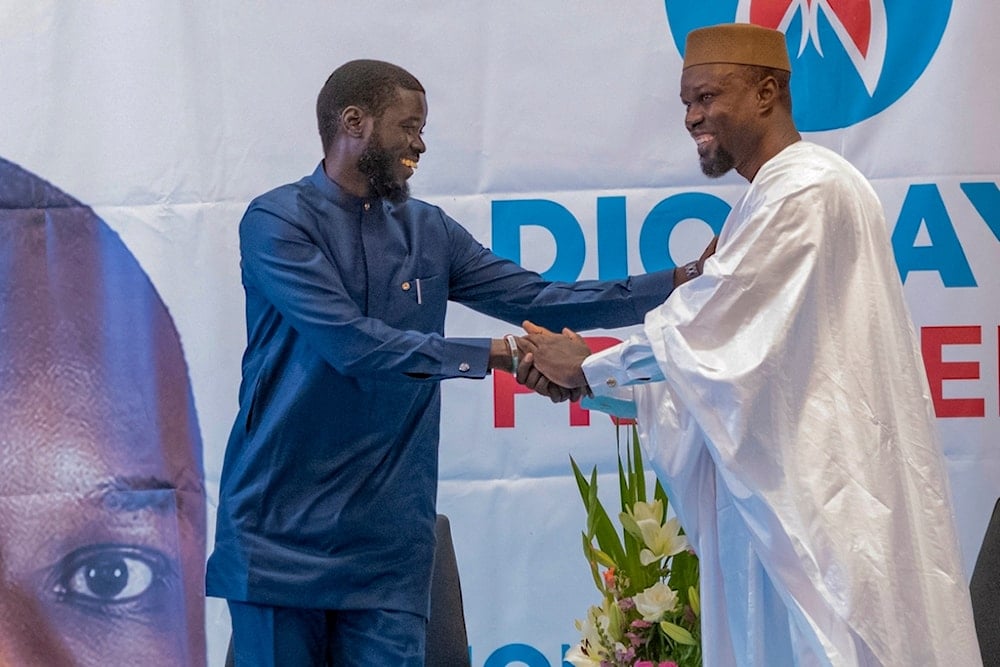Pro-Pan-Africanism president brings new hope for Senegal
As Bassirou Diomaye Faye takes office and vows for a better Senegal, he appoints Ousmane Sonko, the infamous opposition figure, as his Prime Minister.
-

Senegal's top opposition leader Ousmane Sonko, right, and his key ally Bassirou Diomaye Faye address supporters in Dakar, Senegal, Friday March 15, 2024. (AP)
On Tuesday, Senegal ordained its newly elected and youngest president, 44-year-old Bassirou Diomaye Faye. Hours later, Ousmane Sonko, who helped the previously convicted president ascend to power, was named Senegal's new incumbent prime minister.
Ousmane Sonko, the prominent opposition figure, was convicted for statements he made, demonstrations he conducted, and other incidents since 2021. Sonko's prior incarceration and trial prompted violent-turned-deadly protests. Undermining state security, criminal association, activities threatening public security and causing major political discontent, and stealing are among the allegations.
Faye was arrested under a defamation charge.
However, both politicians were released a few weeks before voting commenced on March 24 after three years of political crisis.
Around 7.3 million voters registered and two favorites emerged: the governing coalition's former prime minister 62-year-old Amadou Ba and Faye, as an anti-establishment candidate.
This victory marks a significant shift in Senegalese politics, as it's the first time an opposition candidate has achieved such a feat in the first round of voting, since the country gained independence from France in 1960. Faye's opponent has conceded defeat, and even outgoing President Macky Sall has congratulated him, hailing it as a victory for Senegalese democracy.
During his celebratory speech, Faye paid tribute to the jailed individuals and those killed in protests and vowed to expedite prosperity and sovereignty in Senegal.
Faye's win, a hope for Senegal
Bassirou Faye was formerly a tax inspector, but his rise to power at a young age gave Senegal's population, which is demographically younger, hope against the traditional political frustration it had witnessed before with representatives that allegedly clung to power and disregarded the need for systematic improvement, the Associated Press reported.
Faye's installment comes at a time when Senegal suffers from high unemployment rates, food prices, and energy costs, mainly driven by the war in Ukraine. The former French colony is also experiencing a rise against France, much like other African nations.
In this context, Faye's campaign focused on expunging corruption and revitalizing Senegal. In a first move to gain the trust of the Senegalese people, Faye publicly declared his assets, which totaled $6,600 in his bank account, and a modest home and land on the outskirts of Dakar.
However, Alioune Tine, founder of the Senegalese think tank Afrikajom Center, said the first challenge for Faye as president would be the formation of his government, which would need to consider the size of the government, diversity, and profiles of those chosen.
“In this work of building a new Senegal, I shall work tirelessly to preserve peace and national cohesion,” Faye reassured his people, “I bear in mind that our most precious resource remains our country’s political stability.”
Sonko came to Faye's backing and said, during a speech from the presidential palace, “We’ll give it everything we’ve got. We will spare no effort to achieve what we have promised the Senegalese: a break with the past, progress, and definitive change in the country.”
According to AP, Senegal's allies are closely monitoring Faye's presidential policies, specifically because of the recent oil and gas discoveries that have proven to be a significant Senegalese asset, yet the population has not seen any benefits reeling for it yet.
Read more: Pro-Pan-Africanism opposition candidate wins Senegalese election

 4 Min Read
4 Min Read








